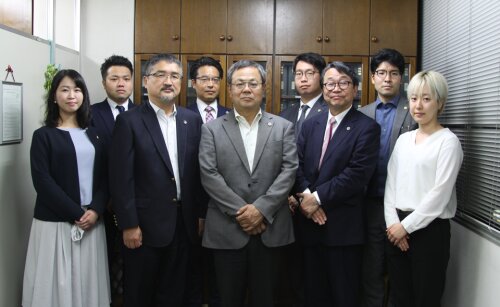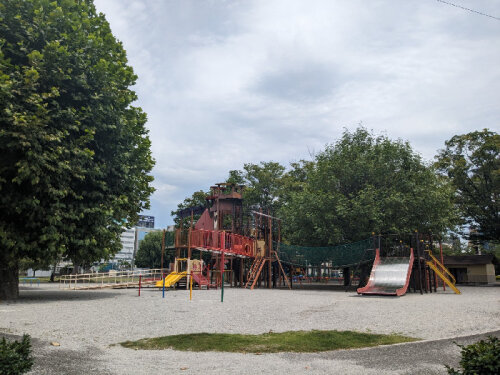Best Construction Accident Lawyers in Shizuoka
Share your needs with us, get contacted by law firms.
Free. Takes 2 min.
List of the best lawyers in Shizuoka, Japan
About Construction Accident Law in Shizuoka, Japan
Construction accidents in Shizuoka are governed by a mix of national statutes and local enforcement. National laws set employer duties for safety, workplace standards, worker protections, and compensation systems. Local authorities and inspection offices enforce those laws on construction sites in Shizuoka Prefecture. If you are injured at a construction site - whether you are an employee, a subcontractor, a temporary worker, or a passerby - several legal frameworks can affect your rights and remedies, including workers' compensation insurance, civil claims for damages, administrative penalties for safety violations, and in serious cases, criminal charges.
Why You May Need a Lawyer
Construction sites involve multiple parties - main contractors, subcontractors, suppliers, site supervisors, and owners - and accidents often raise complicated questions about responsibility and compensation. A lawyer can help in many common situations, for example:
- When your employer or insurer denies that the injury was work-related.
- When you are a subcontractor, temporary worker, or labeled as an independent contractor and you need help proving employment status or eligibility for workers' compensation.
- When the workers' compensation insurer offers an inadequate payment or refuses disability ratings you believe you deserve.
- When you need to pursue civil damages from a negligent party for pain and suffering, loss of income, future medical needs, or death benefits for survivors.
- When the accident involves multiple liable parties and you need to allocate fault or pursue third-party claims.
- When criminal or administrative enforcement is relevant, such as serious safety-law violations that caused death or severe injury.
Local Laws Overview
The following legal instruments and local authorities are particularly relevant in Shizuoka construction-accident cases:
- Industrial Safety and Health Act: Requires employers to take measures to prevent workplace accidents, provide training, maintain safety equipment, and prepare safety-management systems.
- Labor Standards Act: Establishes basic employer obligations, working conditions, recordkeeping, and duties that affect compensation and workplace protections.
- Workers' Accident Compensation Insurance system: Provides medical expense coverage, temporary and permanent disability benefits, and survivor benefits for work-related injuries and illnesses. Applications and disputes are handled through local labor standards inspection offices and the relevant insurers.
- Civil Code - tort liability: Separately from insurance, injured parties may bring tort claims against negligent parties for damages not fully covered by workers' compensation, such as pain and suffering and future loss of earning capacity.
- Penal Code and administrative regulations: Serious breaches of safety rules can trigger criminal prosecutions or fines against responsible managers or companies. Local building and construction regulations may also create grounds for administrative enforcement.
- Local enforcement bodies in Shizuoka: The Shizuoka Labour Bureau and the Labour Standards Inspection Offices help administer workers' compensation and enforce labor and safety laws. Municipal building and construction divisions handle site permits and code compliance.
Frequently Asked Questions
What should I do immediately after a construction accident?
Get medical attention first. Notify your supervisor or the site manager, and make sure an official accident record or report is made. Preserve evidence - photos of the scene and injuries, witness names and contact details, any safety logs or site instructions. Report the accident to your employer's workers' compensation carrier and ask for guidance on filing a workers' compensation claim. If you suspect a crime or severe safety violation, report to the Labour Standards Inspection Office and, if necessary, the police.
Am I eligible for workers' compensation if I am a subcontractor or day laborer?
Possibly. Workers' compensation eligibility depends on whether your work relationship qualifies as employment under the relevant rules, not only on the contract label. Subcontractors or day laborers may be covered if they are effectively in a subordinate work relationship or if the insurer recognizes the coverage. Disputes over status are common, and a lawyer can help gather evidence showing employment-like conditions.
What kinds of benefits does workers' compensation provide?
The system typically covers necessary medical treatment, compensation for lost wages during temporary inability to work, disability benefits for permanent impairment, and survivor benefits if a worker dies. There can also be rehabilitation support. The exact amounts and procedures depend on the injury severity and the insurer's rules.
Can I sue my employer or a third party in addition to receiving workers' compensation?
Yes. Workers' compensation provides no-fault benefits but generally does not bar civil claims against negligent third parties. Civil suits against the employer are more limited because the workers' compensation scheme often provides the primary remedy against the employer; however, if an employer acted with gross negligence, intentional wrongdoing, or if other parties are liable, a separate tort claim may be possible to recover damages not covered by insurance.
What evidence is most important to support my claim?
Key evidence includes medical records and diagnostic reports, the employer's accident report, witness statements, photos or videos of the accident scene and hazards, employment contracts or pay records, daily work logs, safety training records, and any correspondence with the employer or insurer. Maintain copies of all receipts and bills for medical expenses and related costs.
How long do I have to make a claim?
Time limits vary. Administrative claims for workers' compensation should be made as soon as possible after the accident. For civil tort claims, Japanese law generally sets limitation periods that can be complex - often a three-year period counted from when you knew the damage and the responsible party, with longer absolute limits for some claims. Because deadlines differ by claim type and facts, consult a lawyer promptly so you do not miss important time limits.
What if my employer refuses to file a workers' compensation claim?
Employers are generally required to cooperate with workers' compensation procedures. If your employer refuses, you can file a claim directly through the Labour Standards Inspection Office, which supervises the workers' compensation system. A lawyer can assist in filing the claim and communicating with the authorities and insurer.
Will there be criminal charges against the company or managers?
Criminal prosecution is possible if safety violations or reckless conduct rise to the level of criminal negligence or intentional wrongdoing, especially in cases of death or severe injury. Criminal investigations and prosecutions are separate from civil and administrative proceedings. If you want to trigger an inquiry, you can report the incident to the Labour Standards Inspection Office or the police; a lawyer can advise on how best to present evidence and protect your interests.
How much compensation can I expect for a serious injury?
Compensation varies widely based on the type of claim, extent of injury, disability rating, lost income, future care needs, and whether the claim is under workers' compensation or a civil suit. Workers' compensation formulas provide specific schedules for medical coverage and disability payouts. Civil damages may include amounts for pain and suffering and future lost earnings and generally require negotiation or litigation. A lawyer experienced in construction accidents can offer a case-specific estimate after reviewing records.
How do I find a qualified lawyer in Shizuoka?
Look for lawyers or law firms with experience in labor law, construction law, personal injury, and workers' compensation. Local knowledge of Shizuoka courts, administrative offices, and typical construction-industry practices is valuable. Ask about prior cases, fee structures, and whether they provide an initial consultation. You can contact the Shizuoka Bar Association or national legal support services for referrals and information about free or low-cost consultations.
Additional Resources
For help, information, and to make official reports, consider contacting the following types of organizations in Shizuoka:
- Shizuoka Labour Bureau and regional Labour Standards Inspection Offices - for workers' compensation administration and enforcement of labor and safety laws.
- Shizuoka Prefectural Government - construction and building departments for site permit and code compliance matters.
- National Ministry of Health, Labour and Welfare - publishes guidance on occupational safety and workers' compensation systems.
- Local police - for accidents that involve criminal conduct, traffic incidents, or where public-safety intervention is required.
- Japan Legal Support Center (Houterasu) and the local Bar Association - for legal information, referrals, and possible low-cost consultations.
- Industry associations and unions - may offer case support, safety advice, or advocacy for workers in certain trades.
Next Steps
If you were injured or are involved in a construction-accident matter in Shizuoka, follow these steps:
1. Seek immediate medical care and obtain clear medical records that link your injury to the accident.
2. Report the accident to your employer and request an official accident report. Ask for a copy.
3. Collect and preserve evidence: photographs, witness names and statements, copies of contracts, pay stubs, safety logs, and correspondence.
4. File a workers' compensation claim promptly. If your employer will not cooperate, contact the local Labour Standards Inspection Office.
5. Consider consulting a lawyer who handles construction-accident cases to evaluate your options, including civil claims and interaction with insurers or authorities. Ask about fees and whether the lawyer offers an initial assessment.
6. Keep detailed records of all medical visits, expenses, income losses, and communications related to the accident.
7. If you believe a serious safety violation occurred, report the issue to the Labour Standards Inspection Office or the police, and inform your lawyer.
Taking these steps early helps preserve your rights, supports a stronger claim, and positions you to obtain appropriate compensation and remedies. A local lawyer can guide you through the legal and administrative processes unique to Shizuoka and Japan.
Lawzana helps you find the best lawyers and law firms in Shizuoka through a curated and pre-screened list of qualified legal professionals. Our platform offers rankings and detailed profiles of attorneys and law firms, allowing you to compare based on practice areas, including Construction Accident, experience, and client feedback.
Each profile includes a description of the firm's areas of practice, client reviews, team members and partners, year of establishment, spoken languages, office locations, contact information, social media presence, and any published articles or resources. Most firms on our platform speak English and are experienced in both local and international legal matters.
Get a quote from top-rated law firms in Shizuoka, Japan — quickly, securely, and without unnecessary hassle.
Disclaimer:
The information provided on this page is for general informational purposes only and does not constitute legal advice. While we strive to ensure the accuracy and relevance of the content, legal information may change over time, and interpretations of the law can vary. You should always consult with a qualified legal professional for advice specific to your situation.
We disclaim all liability for actions taken or not taken based on the content of this page. If you believe any information is incorrect or outdated, please contact us, and we will review and update it where appropriate.











